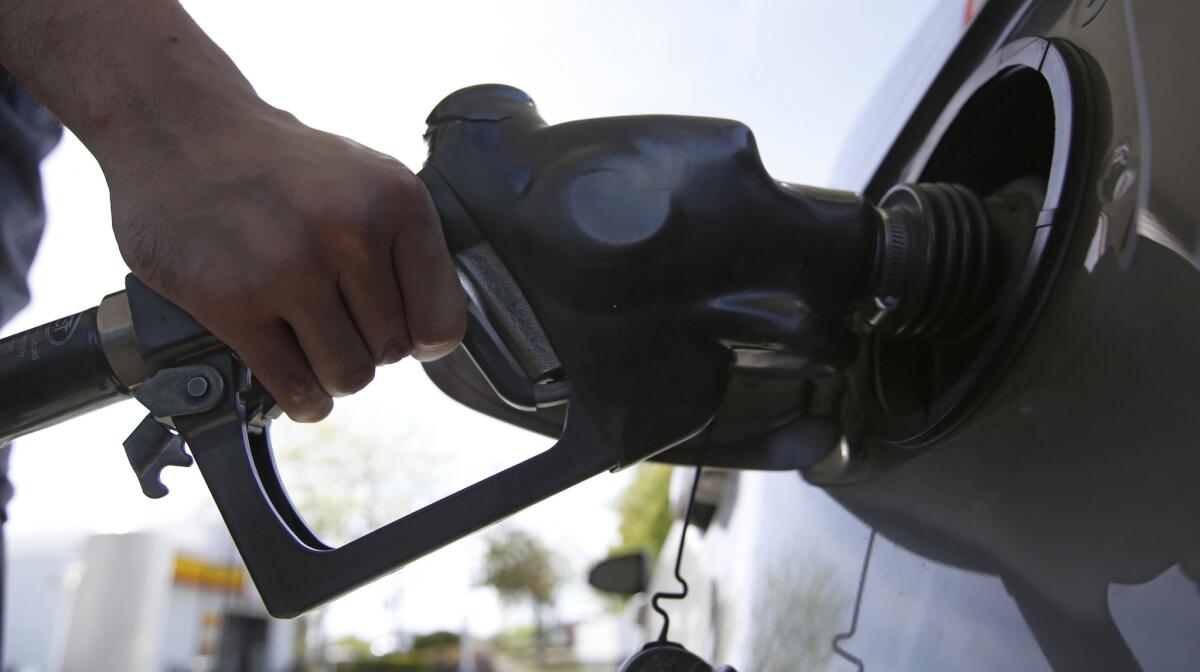Column: Californians want answers on high gas prices — but politicians rarely deliver

- Share via
The governor of California was frustrated. Seeking answers to why the state’s motorists were digging ever deeper into their wallets to fill up the gas tank, he called for a special investigation.
That’s what Gov. Gavin Newsom did last week. And it’s the same action then-Gov. Arnold Schwarzenegger took almost exactly 13 years ago.
So what did the 2006 investigation reveal about the high cost of gas in California? Not much.
“There is no clear evidence as to what caused this spike,” the Republican governor told reporters two months later after he reviewed the initial findings. “But the key thing is, whatever the problem is, I think we should solve it.”
The final 2006 report from the California Energy Commission fell back on familiar themes — unexpected production outages at several of the state’s oil refineries, problems importing from other places, requirements for the special blend of gas sold here as compared with other states. But no single explanation emerged for what was happening. Industry officials chalked it up to little more than supply and demand.
In fact, there’s almost a tradition of California lawmakers demanding explanations for high gas prices and getting little in return. Similar inquiries in the 1990s and again in the early 2000s ended with something akin to a political shoulder shrug.
Sign up for the Essential Politics newsletter »
Newsom, in his letter last Monday to energy commissioners, lamented that some are blaming the current high prices — averaging around $4 a gallon statewide, more in some local communities — on California’s aggressive efforts to combat climate change with mandates for cleaner-burning fuel.
“Already, opponents of our state’s world-class environmental protections are using media reports on this issue to undermine our clean air and safety standards,” the governor wrote.
Others have used the recent surge in prices to again take aim at the 2017 state law that raised taxes on gas and diesel fuel, the proceeds earmarked for road and highway repairs. But even before those new taxes were contemplated, prices began to inexplicably rise. Severin Borenstein, who studies the energy sector at the UC Berkeley Haas School of Business, wrote in The Times last fall about a 22-cents-per-gallon “mystery surcharge” that first appeared in 2015 and which can’t be explained by taxes or environmental regulations.
Borenstein believes that price hike alone is costing California drivers at least $4 billion a year. “Who’s getting the money?” he asked in an interview last week on San Franciso’s KQED public radio. “We don’t know.”
A group of Democratic legislators asked state Atty. Gen. Xavier Becerra in January to investigate the surcharge. There’s been no confirmation whether such scrutiny is underway.
Not that all gas price increases are equal in the eyes of the state’s drivers. A majority of adults in a 2017 summertime poll by the nonpartisan Public Policy Institute of California thought the state’s aggressive climate change policies would boost gas prices — and yet a roughly equal number still supported those policies. Perhaps, then, it’s the unexpected and sharp price hikes that are most likely to fuel public anger.
Newsom, who faces pressure from environmentalists to take a strong stand against the oil industry, asked energy officials to “help shed light” on the causes of the current price spike. He wants their analysis by May 15 — probably long enough for the same kind of survey that state analysts conducted in 2006. And yet the topic, if handled skillfully, could provide the governor and elected officials from both major parties an opportunity to speak directly to a broad cross-section of struggling Californians, from rural families to working-class drivers stuck on congested urban freeways. Demystifying the price of gasoline could pay political dividends for years to come.
Follow @johnmyers on Twitter, sign up for our daily Essential Politics newsletter and listen to the weekly California Politics Podcast.
More to Read
Get the L.A. Times Politics newsletter
Deeply reported insights into legislation, politics and policy from Sacramento, Washington and beyond. In your inbox twice per week.
You may occasionally receive promotional content from the Los Angeles Times.











